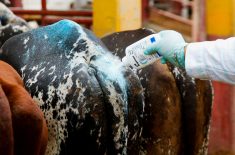Cargill, Canada’s biggest beef processor and the third-largest meat producer in the U.S., says more testing needs to be done on the feed additive Zilmax — and the last cattle fed with the drug will be out of its production supply by the end of September.
Past that, Cargill says it will suspend purchase of Zilmax-fed cattle in North America, pending research being conducted by Merck, the drug’s maker, to give producers “adequate time to transition cattle currently being treated with Zilmax.”
Zilmax became the focus of attention in the livestock industry after Tyson Foods said Aug. 7 that it will stop buying Zilmax-fed cattle for slaughter beginning next month.
Read Also

U.S. grains: Soy futures set 15-month high after China agrees to purchases
U.S. soybean futures reached a 15-month high on Thursday after President Donald Trump’s administration said top-importer China agreed to buy tens of millions of tons of American crops in the next few years as part of a trade truce.
Tyson, the biggest U.S. meat processor, said it was concerned about Zilmax potentially causing health or behavioural problems for some cattle.
Merck’s Animal Health unit announced on Aug. 16 that it would halt U.S. and Canadian sales of Zilmax, pending additional company research and review.
“While Cargill has not linked Zilmax to any specific incidents involving animal well-being, the company does believe more research is necessary to answer recently raised questions regarding the use of this product,” the company said in a statement on its website.
Zilmax is part of a family of drugs called beta-agonists, a class of non-hormone growth promoters that have been deemed safe for animals and humans by the U.S. Food and Drug Administration.
Such products are fed to cattle in the weeks prior to slaughter to increase weight by as much as 30 pounds of lean meat.
Minnesota-based Cargill noted in its statement it was the last major beef packer to allow cattle fed Zilmax into its beef supply chain, in June 2012, after the drug’s launch in the U.S. in 2007.
“One reason Cargill was initially reluctant to accept cattle fed Zilmax was a series of extensive beef tenderness tests that created concern about potential impact to product quality,” the company said.
Cargill said it developed best practices on the matter between 2006 and 2012, by which time an estimated 70 to 80 per cent of the U.S. cattle herd was being fed Zilmax or Optaflexx — a similar beta-agonist growth promotant produced by Elanco.
“With such a high percent of cattle being fed beta-agonists, combined with a drought-depleted U.S. cattle herd, Cargill Beef determined that, when employing best practices, the business would accept Zilmax-fed cattle. Of the major U.S. packers, Cargill harvests the lowest percentage of cattle fed Zilmax.”
Cargill, whose plants at High River, Alta. and Guelph, Ont. make up 55 per cent of the beef processing market in Canada, stressed there are no food safety issues associated with Zilmax or its decision to suspend purhcases of treated cattle.
“Instead, this decision is linked to Cargill’s commitment to ensure the welfare of cattle harvested in the industry.” — Reuters/AGCanada.com Network staff
Related stories:
Q+A: Temple Grandin on Zilmax, beta-agonists, Aug. 23, 2013
Merck halts Zilmax sales, to study cattle feed additive, Aug. 16, 2013










